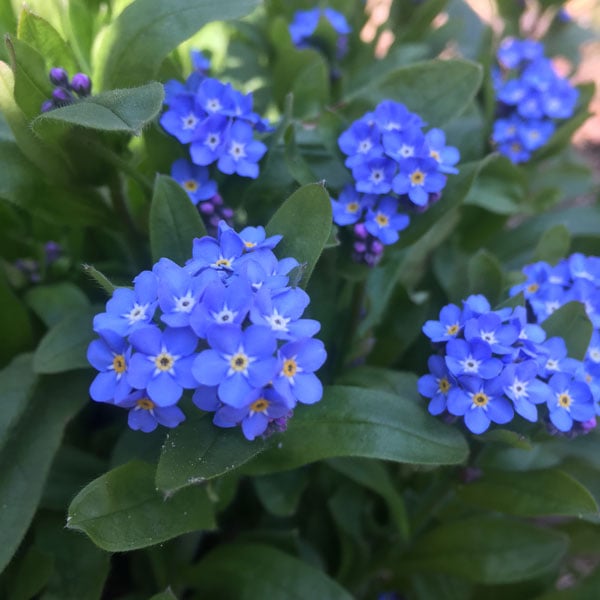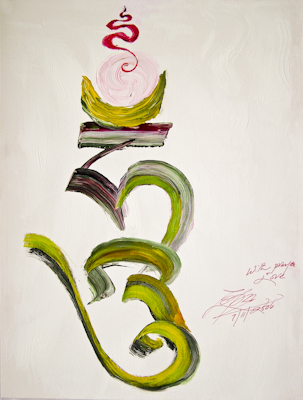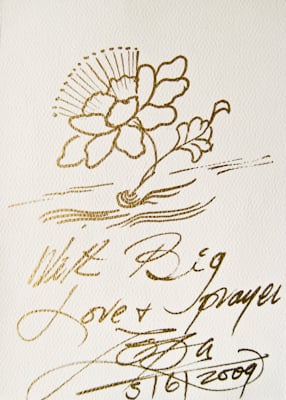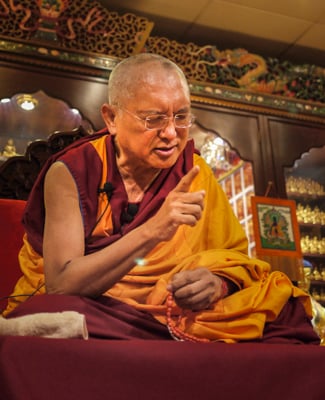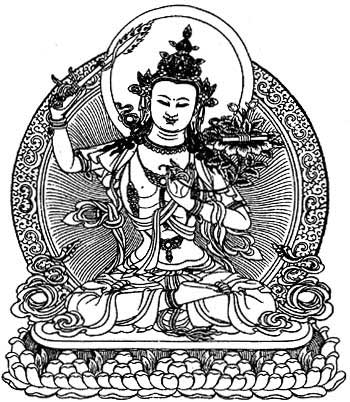My most dear, most precious, most kind, wish-fulfilling one,
I’m so happy that you express what you need and how things have been, but first I’m happy that you tried to help. You shouldn’t expect, when you work for others, that everyone will listen to you, and will be humble to you, and that everyone will praise you as though you’re the Buddha, or some kind of best or highest person.
I always advise directors that when they become director, they should expect to be the one who receives the complaints, or to receive complaints from many people. They should expect that.
When you become the object of criticism, when that happens, actually when you become the director, then it doesn’t matter much when that happens. It doesn’t make you upset or angry because you expect it to happen and you don’t reject the criticism, but accept it. If you reject it, then generally a problem arises. If you accept the mistake or problem, there’s peace, so much peace and happiness.
For example, in the Eight Verses by the Kadampa Geshe Langri Tangpa:
When, out of envy, others mistreat me
With abuse, insults, or the like,
I shall accept defeat
And offer the victory to others.
Think, “When others complain, I will offer them the victory. With a jealous mind they criticize me and do unworthwhile things at that time. I take the loss upon myself and practice offering the victory to others.”
So it says in the commentary that even if you didn’t make the mistake, but somebody else did, if somebody complained that you did it, then you happily accept that you made the mistake. So you take the loss on yourself and offer the victory to the other person. In this way it helps in this life, also for all your wishes to be more successful and for more happiness in your life.
By doing this one time, then just from that one time so much success and happiness comes in your future lives—probably for five hundred years—and your wishes come true. Then like that, for thousands and hundreds of thousands of years, it goes on up to enlightenment; it brings you to enlightenment. You will have unbelievable, more and more happiness and success.
Then in the future, if you make this mistake, someone else will take the loss and offer the victory to you. In this lifetime what you did, then the result is that other people will take it happily, like that, then you go to enlightenment. It’s unbelievable. And then after enlightenment, you will be able to liberate numberless sentient beings from the oceans of the lower realms’ suffering, and from the oceans of samsaric suffering, and bring them to peerless happiness, enlightenment, buddhahood. This result is incredible. Wow, wow, wow, wow, wow, wow, wow, wow, wow, wow.
So you need to wake up now by understanding this. This is like a ringing a bell, a big bell that everyone in the country hears, even in the caves and in the forest. Even the ants can hear it, not only the people.
Please read my book on Bodhichitta, and the book by my guru, the great bodhisattva Khunu Lama Rinpoche, The Jewel Lamp: A Praise of Bodhicitta [published as Vast as the Heavens, Deep as the Sea]. Please read these books often, again and again. It’s also good to study Bodhicaryavatara, and there are also commentaries. Read about the benefits of bodhicitta again and again in Bodhicaryavatara. It’s good to read this book, starting from the beginning and reading it to the end. It’s always good to read and to study all the time, wherever you go.
I received the lung from Kyabje Khunu Lama Rinpoche. He told me about the refuge qualities of Buddha, Dharma and Sangha, and the defects of the Hindu gods, Indra, Brahma, and so forth. [See also pp. 69–70, The Nectar of Bodhicitta.] [The followers of these gods] in all their lives, like in their family life, have so much attachment, anger, and ignorance, jealousy and so forth, again and again.
The Buddha’s life didn’t have these things and it was the opposite. The Buddha only has great compassion embracing all sentient beings. It’s incredible. And he is omniscient, knowing everything directly—past, present, future. He can directly read the minds of numberless hell beings, numberless hungry ghosts, numberless animals, numberless humans, numberless suras, and numberless asura beings at the same time. It’s like that, the Buddha can directly read the minds of sentient beings.
The Buddha can see all the different karma, the different suffering and delusions, everything, and how to guide each sentient being to enlightenment.
So all this should be based not only on reading what is in the newspaper; the idea is to apply it to your mind whenever you can. It should be like that and not like reading the world newspaper every day; not like that.
The whole thing is based on what the purpose of life is. If you don’t know the purpose of life, then you care about everything else instead. You have to know the very essence, the purpose of life, then you live your life based on that.
The purpose of your life is like this, not just for the happiness of this life; that is not the special purpose of having a human body. Even tigers, rats, spiders, scorpions and snakes have pleasure of this life, so that alone is not special. Even ants are keeping so busy looking for food and looking for happiness. Like that, other insects are so busy looking for happiness and food. That’s nothing special and doesn’t fulfill the purpose of taking a human life.
So, what is special? Living with attachment to the happiness of this life is nonvirtue, then actions done with body, speech, and mind, all three are negative actions, and the result is only suffering.
So even if we do meditation with that motivation, reading Dharma texts, meditating and reciting prayers, that action becomes nonvirtue. With that motivation, any action done with body, speech, and mind becomes nonvirtue, and it causes so many problems not just in this life, not only that, but the result is suffering in the lower realms. Not just for one minute or one second, but for eons, for a long time, and it’s not sure if we can even hear a human voice for eons.
Instead of seeking happiness for this life, we need to renounce the happiness of this life [and seek] future lives’ happiness—future lives means not one, but numberless, until we’re free from samsara. That happiness is really, really important, because it’s not just one life, two lives or three lives, but numberless, until we’re free from samsara. It’s amazing. All those future lives are so much more important than the happiness of this life, which is only for a few years, a few months, a few weeks, a few hours, a few minutes or a few seconds.
So we need to do the actions of our body, speech, and mind with that motivation, not seeking the happiness of this life as the main thing. The main thing is the happiness of our future lives, almost, we can say, for numberless future lives, until we’re free from samsara, so our motivation is for all these future lives’ happiness. That’s amazing, amazing; that makes sense, that is Dharma, that is the very first Dharma, the basic, positive action.
So that motivation doesn’t have attachment. We need to understand that if we don’t cling to this life’s happiness, and instead, we seek happiness of future lives, that is positive, that is Dharma, that is virtue. So then the actions done with our body, speech, and mind become virtuous, and the result is only happiness, not suffering; there is no lower realm suffering.
So that’s the first purpose, the first meaning of the human life, how to live the life. That means with the mind, whether you’re a beggar or a millionaire that depends on the mind. Whether you live a nonvirtuous life, a non-Dharma life, or a virtuous life, all depends on the motivation. It doesn’t depend on how much money you have, or how much ice cream or pizza you have, or how many drugs, hashish, you have.
Now, the next meaning of life, instead of seeking the happiness of future lives, which is still samsaric happiness, we have to let go of that, we don’t have attachment to that, we become free from that attachment.
The main thing that we’re looking for is ultimate happiness, liberation from samsara and the oceans of suffering of the six realms forever. What we are looking for is ultimate happiness, [not just] the happiness of future lives, which is still samsaric happiness, a way of using the human life. The actions of body, speech, and mind done with that motivation—seeking ultimate happiness, liberation from samsara—become the cause of ultimate happiness, liberation from samsara forever. It’s amazing, amazing.
Now the third meaning of life, instead of looking for that, we renounce that lower nirvana, the ultimate happiness of liberation. We renounce that because it is not what we’re looking for. What we’re looking for is great nirvana, buddhahood, peerless happiness, the true cessation of gross defilements and subtle defilements, and completion of all realizations, sang gye in Tibetan.
As I mentioned before, after we achieve this, then we can do perfect work for sentient beings, freeing them from the lower realms, freeing them from the whole entire suffering of samsara and bringing them to enlightenment.
To do perfect work for sentient beings we need to achieve enlightenment. [We need] that thought to achieve enlightenment, for oneself to achieve enlightenment, then having the thought to free all the numberless sentient beings from the oceans of samsaric suffering and bring them to perfect enlightenment.
His Holiness often says that the thought to benefit sentient beings comes from compassion and the thought to achieve enlightenment is wisdom. That is so important, otherwise we can’t do perfect work for others.
The third motivation is the main one, so this is the greatest meaning of our human life, and this is what we should think of every day. We should generate this every day in the morning, first thing in the morning. When we eat food, when we go to sleep, when we go to the toilet, when we are walking, anytime, this is what we should have, as much as possible.
The basic practice, the attitude of the buddhas and even bodhisattvas is that however the earth is used by sentient beings, it’s for their happiness, in all kinds of ways. The different houses, companies, airports, trains, cars, skiing, so many different things, are all for the happiness of the sentient beings. Water is used by sentient beings in so many ways for their happiness. Fire is used by sentient beings in so many ways for their happiness. Wind is used by sentient beings in so many ways for their happiness. The sky is used by sentient beings in so many ways for their happiness.
So like that, use the examples from the Bodhicaryavatara and from Nagarjuna’s teachings. So it is up to the sentient beings how they use you for their happiness. Think that you have given your life; you have given your body, speech, and mind, your possessions, all the three-time merits, everything to the sentient beings, to all the six-realm sentient beings, everyone. Think there’s not even one ant that’s not being given to, dedicated for. There’s not even one mosquito that you didn’t dedicate for. There’s not even one person, there’s not even one crocodile that you’ve not dedicated for. So you should live your life for the sentient beings and do everything for the sentient beings.
Even if you take medicine, your life is to benefit others. Also if possible, you can pray to Medicine Buddha, knowing the benefits and reciting the mantra. You can pray and take medicine with the motivation for your life to be beneficial for all sentient beings. So even when you take medicine, it’s for benefiting sentient beings. Even if you go to the hospital, the dentist, anything; or if you have diarrhea and go to the hospital, it’s for the sentient beings; anything, cancer treatment, food or sleep, it should be like that. Everything you do is for sentient beings, not for yourself.
This is the main attitude we should live with for our whole life, day and night. This is the [cause of] happiness. If we’re able to do this, unbelievable happiness comes from this. Even if we die, we die with happiness; even if we’re sick, we’re happy; whatever happens, we have so much happiness. This is mentioned in The Jewel Lamp: A Praise of Bodhicitta, by Khunu Lama Rinpoche.
Otherwise, when we’re with people, at the beginning we want to help them, then when we get involved in the organization, any organization, when it can’t benefit the old people or the kids, whatever it is, then we get crushed, our ego gets crushed, crashed, like a car crash. There’s so much crash, because of attachment to others or anger toward others; there’s so much ego, then we crash and we end up with everybody as enemy.
Because of our self-cherishing thought, other people’s self-cherishing thought, we make everybody the enemy; we make the whole organization, the members, the people, everyone becomes the enemy. We think they don’t like us, but we have made them dislike us. We don’t know that we’re the one that made them dislike us. It’s like that, but we don’t think that way.
So if we live life generating bodhicitta in the morning, if that’s our purpose in life, then as I said before, how the buddhas and bodhisattvas live their lives, then we can give and cause so much happiness for our wife, our husband, our children, our family, our neighbor, our own country, the world, and then all the six-realm sentient beings. We can give them so much happiness.
Just a small example, there’s a very famous man, the richest man in the world, Jeff Bezos; after he and his wife were divorced, his wife donated billions of dollars when the COVID19 virus started. She gave the money to people who needed it, so that is really incredible. She gave so much, it’s really good, and also now her husband is giving donations. It’s incredible. It’s a small example, but they gave so much happiness to others and to the world. Wow, wow.
If our attitude changes, instead of cherishing the I, we cherish others; instead of letting go of others, we let go of the I, where the suffering—past, present and future—all the suffering of samsara, came from. When we follow the self-cherishing thought, then we’re under the control of that, then that makes us harm the numberless sentient beings and cause them to suffer.
Therefore, by cherishing others, we receive all the happiness from others. If we cherish others, if we let go of I and cherish others, then from that, all the happiness comes. Immediately we change our mind there’s happiness in our life; we find happiness and that happiness develops and develops every day.
When we develop this attitude, we can achieve all the happiness of this life and in all our future lives, as well as liberation and enlightenment, and then we can bring all the happiness, especially enlightenment, to numberless sentient beings.
One thing I didn’t answer: the motivation of cherishing I, letting go of others, that itself becomes an obstacle to achieving happiness.
In the Bodhicaryavatara, the bodhisattva Shantideva says:
[8:131] If I do not actually exchange my happiness
For the sufferings of others,
I shall not attain the state of buddhahood
And even in cyclic existence shall have no joy.
If the exchange of oneself for others is not done, we can’t achieve enlightenment. Even in samsara we will have no happiness, and even the happiness of this life won’t succeed.
For example, servants won’t listen to us or do work for us, and leaders won’t give us wages or prizes, and the works of this life don’t succeed.
[8:132] Let alone what is beyond this world—
Because of my servants doing no work
And because of my masters giving me no pay,
Even the needs of this life will not be fulfilled.
Then we think, “It’s not me; they judged me, they did this to me. That person made the mistake.”
Wow, not only did we make the mistake, but also, we said somebody else did it, no question. We think, “I didn’t do this,” and we give the problem to another person. We take the profit and we give the loss to others. At that time we’re creating the biggest obstacle to achieving happiness in this life, and then that’s the cause of not achieving happiness in all our future lives and for our wishes to not get fulfilled.
We will always have obstacles, not only to achieving ultimate happiness, freedom from samsara—that doesn’t happen. We will have so many obstacles, we can’t achieve that, and then no question of attaining the peerless happiness, enlightenment. That comes from bodhicitta, cherishing others; it never comes from the self-cherishing attitude, the self-cherishing thought, which is the worst enemy of bodhicitta.
If we want to help others, to help sentient beings, that means we want to give them happiness, to cause happiness to others. In that case, it depends on our mind, changing our mind, letting go of the I, from where all the suffering comes, and cherishing others, from where all the past, present, and future happiness comes, including enlightenment.
So giving all the happiness up to enlightenment to all sentient beings is up to our mind; it’s done with our mind. And we have to start to cherish others, for our mind to cherish others. Please remember this.
In the Bodhicaryavatara it says whoever wants to save or guide oneself and others should exchange oneself for others, and practice this secretly. Write this down in your prayer book, or in big letters in your room or in your office, whether it’s a company or whether it’s a center.
[8:120] Thus whoever wishes to quickly afford protection
To both oneself and other beings
Should practice that holy secret:
The exchanging of self and others.
This verse contains so much. In our life we think about success for ourselves, [not] success for others, so if we want that success, then what we need is the bodhisattva practice—exchanging oneself for others. That’s the answer. We don’t need to get lost in all the thinking, “Oh I can’t manage.” No, the answer is right there. The great bodhisattva Shantideva mentioned this in the Bodhicaryavatara.
This is the most practical answer and the method to achieve happiness and success for oneself and success for others, success for numberless sentient beings, not just one person. The answer is there in our life; the answer is there right now. It depends on our mind, whether we change the mind or not, whether we follow the self-cherishing thought, grasping at the self, the I, cherishing the I, all the time I, I, I. We’ve been doing that since beginningless rebirths and that’s why we are still suffering in samsara.
We have to know how to benefit others, this is what I’m explaining, so please read this motivation first thing in the morning, my motivation, The Method to Transform a Suffering Life into Happiness (Including Enlightenment). I tell many students to do this. It was prepared a long time ago, many years ago, but I have elaborated a little bit at the beginning and at the end, for some Tibetan people to do in the old folks home in South India.
You must do this practice first thing in the morning. It contains so much of the Bodhicaryavatara on how to live your life in the most positive way, the happiest way. To live your life for others, as I mentioned before.
There’s another book called Bodhisattva Attitude: How to Dedicate Your Life to Others, with words, quotations. It’s similar to that, for example, how to think when you take off your shoes, when you sit down, when you go to the toilet, all those things.
Since we don’t have bodhicitta, it’s very good to learn how to do everything with bodhicitta; that's very good. If we have bodhicitta, then naturally everything that we do is done with bodhicitta. Naturally everything is done with bodhicitta.
So now for your purification, according to my observation, I suggest you do 400,000 Vajrasattva mantras. You can do some in retreat with more sessions, and if you’re working, sometimes just do one or two sessions, perhaps in the morning and the evening. You can do some recitations of Vajrasattva mantra with prostrations, or sometimes when sitting.
If we live with bodhicitta motivation, then every action of body, speech, and mind that we do becomes a cause of enlightenment, the highest happiness, so then there’s not much to purify, so it helps, it’s incredible.
The person who’s angry with us, who doesn’t like us, our enemy, that is our yidam, so that helps us develop bodhicitta, compassion, patience, and then that makes us to achieve the path to enlightenment. Then we’re able to cause all the happiness up to enlightenment for every sentient being, every ant, every mosquito, every single sentient being.
So then regarding the shamatha meditation object you can use Tara, but visualize a tiny Tara on the tip of your nose. The smaller it is then you’re more able to control the mind from distraction. Don’t close your eyes when you meditate; just close them enough to see the tip of your nose and keep your posture straight so that if a grain from the tip of your nose were to drop, it would drop to the navel, like that.
Or you can use the breath going in and out as the object of meditation. Normally that’s an easy way to achieve shinä.
If you visualize the Buddha, then you collect the most unbelievable merits—amazing, amazing—you collect merit almost like the atoms of the earth by looking at the Buddha, the holy form, so you can do that.
The best, the clearest teaching on shamatha is in Liberation in the Palm of Your Hand. I was told this by my guru, who had complete experience of the whole lamrim. So study that, meditate and study that.
Thank you very much. You are most welcome to enlightenment. Goodbye samsara and most welcome to enlightenment.
With much love and prayers,
Lama Zopa
P.S. If you can, do the extra beginning and end of the morning motivation (The Method to Transform). If you can do that with the prayers every day, then start with that. That’s really so good, really good, even you just do that.
























